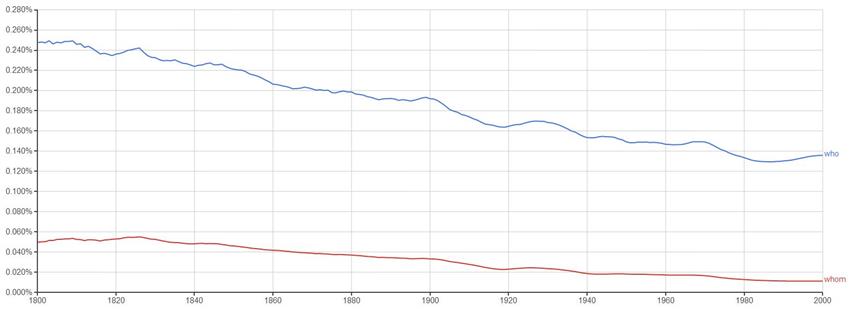Who vs Whom often comes up and sometimes causes confusion. This article explains the difference between these two.
Who and whom are both pronouns and while they mean the same thing (a person or group of people) they are grammatically different.
Subjects vs Objects
The subject of a sentence is the “main actor” in the sentence and normally it comes at the beginning of the sentence:
Louisa sang a song.
Quite simply, to make a question about the subject of a sentence, we use who:
Who sang the song? Louisa sang the song.
Who won the game? We won the game.
Conversely, the object of a sentence receives something from the subject:
Frank kissed his wife.
Now if we make a question about the object of a sentence, we use whom:
Whom did Frank kiss? Frank kissed his wife.
Whom did you play? We played Barcelona FC.
Who or Whom
Grammatically, there is same distinction between who/whom as there is between I/me and he/him, she/her, etc. That is one is a subject pronoun, the other is an object pronoun. Thus if you are confused over which is correct to use, you can simply substitute I/me or he/him or she/her.
Here is a typical sentence you might have problems with:
Regan was the policeman [who or whom] I saw last night.
Rewrite this using he/him instead:
I saw Regan last night
I saw him last night
Him is an object pronoun, just like whom. So the correct sentence is:
Regan was the policeman whom I saw last night.
Common Usage
Having said this, in modern usage whom is often dropped in favor of who. It is not difficult to find many examples and hear English like this:
Who did they meet?
Who did he give it to?
Who do you love?
Although some traditional grammarians will point these out as mistakes they are in such common usage that they could almost be classed as correct, standard English now. This has led to a generally perceived notion that whom is more formal and educated than who.
Google n-grams
The following graph shows the usage of whom in writing from 1800 to 2000. It distinctly shows that the use of whom has dropped dramatically to about a quarter of what it was in 1800. Has its use been replaced by who? Difficult to say because looking at n-grams from who we see that usage for that has also dropped!

Did you know that if you subscribe to our website, you will receive email notifications whenever content changes or new content is added.
1. Enter your e-mail address below and click the Sign Me Up button.
2. You will receive an email asking you to confirm your intention of subscribing to our site.
3. Click the link in the email to confirm. That’s all there is to it! Note: if you wish to unsubscribe from our site, click the unsubscribe link at the bottom of the email you received.
Then indicate you no longer wish to receive our emails.
Thank You
IWeb TEFL Team
